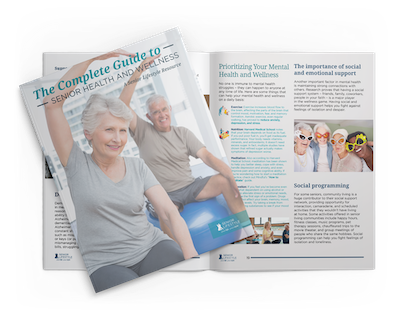Retirement is often viewed as a period of relaxation and leisure, but many seniors continue to experience stress in their day-to-day lives. For caregivers and family members who may not see their loved ones daily, understanding the sources of this stress and stress management techniques for seniors is crucial.
This article explores common stressors and provides stress management tips and techniques for seniors.
Common Sources of Stress for Retired Seniors
While retirement can be a time of enjoyment, many seniors face stress affecting their daily lives. Understanding these difficulties can help caregivers and family members provide better support.
Health Issues
As people age, they often face a variety of health problems. Chronic conditions, such as arthritis, diabetes, heart disease, and osteoporosis can significantly impact a senior’s quality of life. The physical limitations that come with aging, such as reduced mobility and stamina, can also be frustrating and stressful.
Moreover, the fear of losing independence due to health issues can weigh heavily on the minds of retired seniors. Regular medical appointments, treatments, and the need for ongoing medication can add to this stress.

Download The Complete Guide to Senior Health and Wellness
As people grow older, their health and wellness needs change. Read our eBook, "The Complete Guide to Health & Wellness for Seniors" for everything you need to know about staying healthy and happy as we age.
Download the GuideFinancial Concerns
Even with careful planning, many retirees worry about their financial stability. The shift from a steady paycheck to living on savings, pensions, or Social Security can be daunting. Unexpected expenses, particularly medical bills, can strain their finances. Inflation and the rising cost of living can further erode the value of their savings.
This financial uncertainty can lead to significant stress, as retirees fear they may not have enough resources to support themselves through their later years.
Social Isolation
Retirement often results in a reduction of daily social interactions, which can lead to feelings of loneliness and isolation. Many retirees miss the camaraderie and routine of their former workplaces. Additionally, the loss of a spouse or close friends can further exacerbate feelings of isolation.
Limited mobility or health issues can make it difficult for seniors to get out and socialize. They also may find it challenging to form new friendships or engage in community activities.
Loss of Purpose
For many individuals, their identity and sense of purpose are closely tied to their careers. Retirement can bring a loss of this identity, leaving seniors feeling aimless or without direction. The structure and goals provided by work are suddenly gone, and some retirees struggle to fill this void.
This loss of purpose can lead to depression and anxiety, as they grapple with the question of how to find meaning and fulfillment in this new phase of life.
Family Dynamics
Changes in family roles and relationships can be another source of stress for retirees. As they age, seniors may become more dependent on their children or other family members for support, which can be difficult to accept. This shift in dynamics can create tension and feelings of inadequacy or burden.
Additionally, family members may have differing opinions on how to best support their older relatives, leading to conflicts and stress within the family.
How to Reduce Stress in Seniors
Retired seniors often face unique points of stress that require tailored approaches to stress management. Here are some specific strategies designed to address the needs and challenges of seniors:
Financial Planning
Effective financial planning provides peace of mind by ensuring that resources are managed wisely. Reducing financial uncertainty can significantly lower stress levels related to money concerns.
Consult with a financial planner to create a sustainable budget, manage investments, and plan for long-term care expenses. Develop a clear monthly budget to track income and expenses, ensuring that spending aligns with financial goals. Maintain an emergency fund for unexpected expenses, providing a financial cushion.
Healthy Diet
A balanced diet supports overall health, boosts energy levels, and improves mood. Proper nutrition can help manage chronic conditions, such as diabetes and heart disease.
Senior Lifestyle communities understand the vital role of the dining experience in our residents’ lives. Each meal represents an opportunity to socialize, make connections, and build relationships with neighbors.
Hobbies and Interests
Engaging in hobbies and new interests can provide a sense of purpose and fulfillment. Hobbies can be a source of joy and relaxation, helping to alleviate stress.
Creative activities, such as painting, drawing, knitting, or playing a musical instrument can be enjoyable and therapeutic. Tending to a garden can be a peaceful and rewarding activity that provides physical exercise and connection with nature. Encourage seniors to read books, join a book club, or write memoirs and stories.
Mindfulness and Relaxation
Mindfulness practices help reduce anxiety and depression, promoting a sense of calm. Relaxation techniques can lower blood pressure, improve sleep, and reduce muscle tension.
Sitting quietly and focusing on the breath or a mantra can help clear the mind and reduce stress. Practicing slow, deep breaths can calm the nervous system and reduce anxiety. For religious seniors, prayer can serve the same purpose.
Routine Medical Care
Regular medical checkups help detect and manage health issues early, reducing anxiety about potential illnesses. Preventive care can maintain overall health and prevent chronic conditions from worsening.
Help seniors by scheduling regular appointments with primary care physicians, specialists, and dentists. Encourage the use of health monitoring tools, such as blood pressure monitors and glucose meters, to keep track of health metrics. Stay up to date with vaccinations, such as flu shots and pneumococcal vaccines, to prevent infections.
Staying Active
Physical activity releases endorphins, which are natural mood lifters. Exercise helps maintain mobility, balance, and overall health, reducing the risk of chronic diseases.
Walking, swimming, yoga, and tai chi can offer workouts geared toward the abilities of seniors of all types. Health care providers should be consulted before any exercise program is begun to ensure seniors are in good health and to find out more about appropriate exercises.
Technology
Technology can help seniors stay connected with loved ones and access resources, reducing feelings of isolation. Learning new technologies can be stimulating and provide a sense of achievement.
Use video calling apps like Skype, Zoom, or FaceTime to maintain regular contact with family and friends. Platforms like Facebook and Instagram can help seniors stay updated on family news and events. Online courses and tutorials can help seniors learn new skills or hobbies, keeping the mind active and engaged.
Volunteer Work
Volunteering can provide a sense of purpose and community involvement, enhancing mental well-being. Helping others can boost self-esteem and reduce feelings of loneliness.
Seniors can volunteer at local food banks, shelters, or community centers. They also can offer skills and experience to younger generations through mentoring programs or tutoring. Seniors also can spend time with patients, offering companionship and support.
Live a Stress-Free Life at a Senior Lifestyle Community
Caregivers and family members can significantly improve their loved ones’ quality of life by understanding the unique stressors faced by retired seniors and implementing appropriate stress management strategies. Regular communication and a proactive approach to addressing these challenges can make a meaningful difference.
Senior Lifestyle communities can help seniors, and their family members, live a worry-free life while we take care of the everyday needs of living, such as cleaning and meal preparation.
Find out more about Senior Lifestyle or schedule a visit today.

